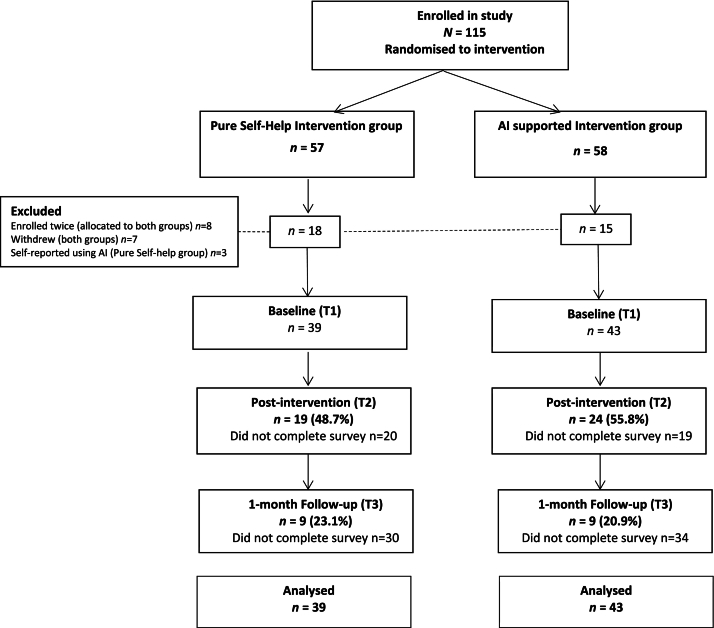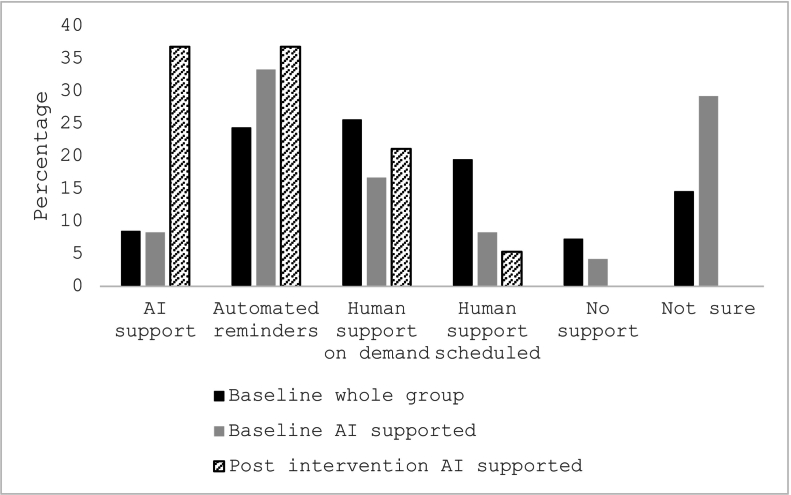Artificial intelligence as a virtual coach in a cognitive behavioural intervention for perfectionism in young people: A randomised feasibility trial
IF 4.1
2区 医学
Q1 HEALTH CARE SCIENCES & SERVICES
Internet Interventions-The Application of Information Technology in Mental and Behavioural Health
Pub Date : 2024-12-01
DOI:10.1016/j.invent.2024.100795
引用次数: 0
Abstract
Background
We examined the feasibility and outcomes of Artificial Intelligence (AI) as a virtual coach in guided self-help (GSH-AI) compared to pure self-help (PSH).
Method
Participants (N = 85 undergraduate university students; M age = 20.65 years [SD = 2.38]; 84 % female) were randomised to PSH (N = 42) or GSH-AI (N = 43). The intervention was a brief 11-module online cognitive behaviour therapy for perfectionism intervention completed over 4-weeks. GSH-AI participants were given suggested questions to ask AI for guidance in completing the intervention. Data were collected at baseline, 4- and 8-weeks post-randomisation.
Results
Engagement was good, only one person in each group did not use any modules; module completion was equivalent across conditions (6.67, SD = 3.22 and 6.18, SD = 3.42 respectively). Between baseline and post-intervention people in the GSH-AI condition showed an almost 3.5 times increase in preferring support to be received from AI versus other modes of support. Only 52 % and 22 % of participants completed 4- and 8-week post-randomisation surveys, with no differences in psychological outcomes between the PSH and GSH-AI groups. Main effects of time indicated moderate to large within-group effect size improvements for disordered eating, stress, anxiety, and perfectionism.
Conclusions
Qualitative feedback indicated that AI was initially acceptable as a guide and became even more acceptable after it had been experienced. Fully powered trials are required to determine the impact of AI guidance on outcomes, and whether type of AI platform (customised versus generic) and type of mental health disorder interact with its effects.


人工智能作为年轻人完美主义认知行为干预的虚拟教练:一项随机可行性试验。
背景:与纯自助(PSH)相比,我们研究了人工智能(AI)作为引导自助(GSH-AI)虚拟教练的可行性和结果。方法:被试(N = 85名本科生;M年龄= 20.65岁[SD = 2.38];84%女性)随机分为PSH组(N = 42)或GSH-AI组(N = 43)。干预是一个简短的11个模块的在线认知行为治疗,用于完美主义干预,完成时间为4周。向GSH-AI参与者提出建议问题,以要求AI指导完成干预。在基线、随机化后4周和8周收集数据。结果:参与程度良好,每组仅有1人未使用任何模块;不同条件下模块完成度相等(分别为6.67,SD = 3.22和6.18,SD = 3.42)。在基线和干预后之间,GSH-AI患者倾向于从AI获得的支持比其他模式的支持增加了近3.5倍。只有52%和22%的参与者完成了随机化后4周和8周的调查,PSH组和GSH-AI组之间的心理结果没有差异。时间的主要作用表明,对饮食失调、压力、焦虑和完美主义的组内效应有中等到较大的改善。结论:定性反馈表明,玩家最初可以接受AI作为一种指南,并且在体验之后会变得更容易接受。需要进行充分的试验,以确定人工智能指导对结果的影响,以及人工智能平台的类型(定制的还是通用的)和精神健康障碍的类型是否与其效果相互作用。
本文章由计算机程序翻译,如有差异,请以英文原文为准。
求助全文
约1分钟内获得全文
求助全文
来源期刊

Internet Interventions-The Application of Information Technology in Mental and Behavioural Health
Medicine-Health Informatics
CiteScore
6.50
自引率
9.30%
发文量
94
审稿时长
6 weeks
期刊介绍:
Official Journal of the European Society for Research on Internet Interventions (ESRII) and the International Society for Research on Internet Interventions (ISRII).
The aim of Internet Interventions is to publish scientific, peer-reviewed, high-impact research on Internet interventions and related areas.
Internet Interventions welcomes papers on the following subjects:
• Intervention studies targeting the promotion of mental health and featuring the Internet and/or technologies using the Internet as an underlying technology, e.g. computers, smartphone devices, tablets, sensors
• Implementation and dissemination of Internet interventions
• Integration of Internet interventions into existing systems of care
• Descriptions of development and deployment infrastructures
• Internet intervention methodology and theory papers
• Internet-based epidemiology
• Descriptions of new Internet-based technologies and experiments with clinical applications
• Economics of internet interventions (cost-effectiveness)
• Health care policy and Internet interventions
• The role of culture in Internet intervention
• Internet psychometrics
• Ethical issues pertaining to Internet interventions and measurements
• Human-computer interaction and usability research with clinical implications
• Systematic reviews and meta-analysis on Internet interventions
 求助内容:
求助内容: 应助结果提醒方式:
应助结果提醒方式:


